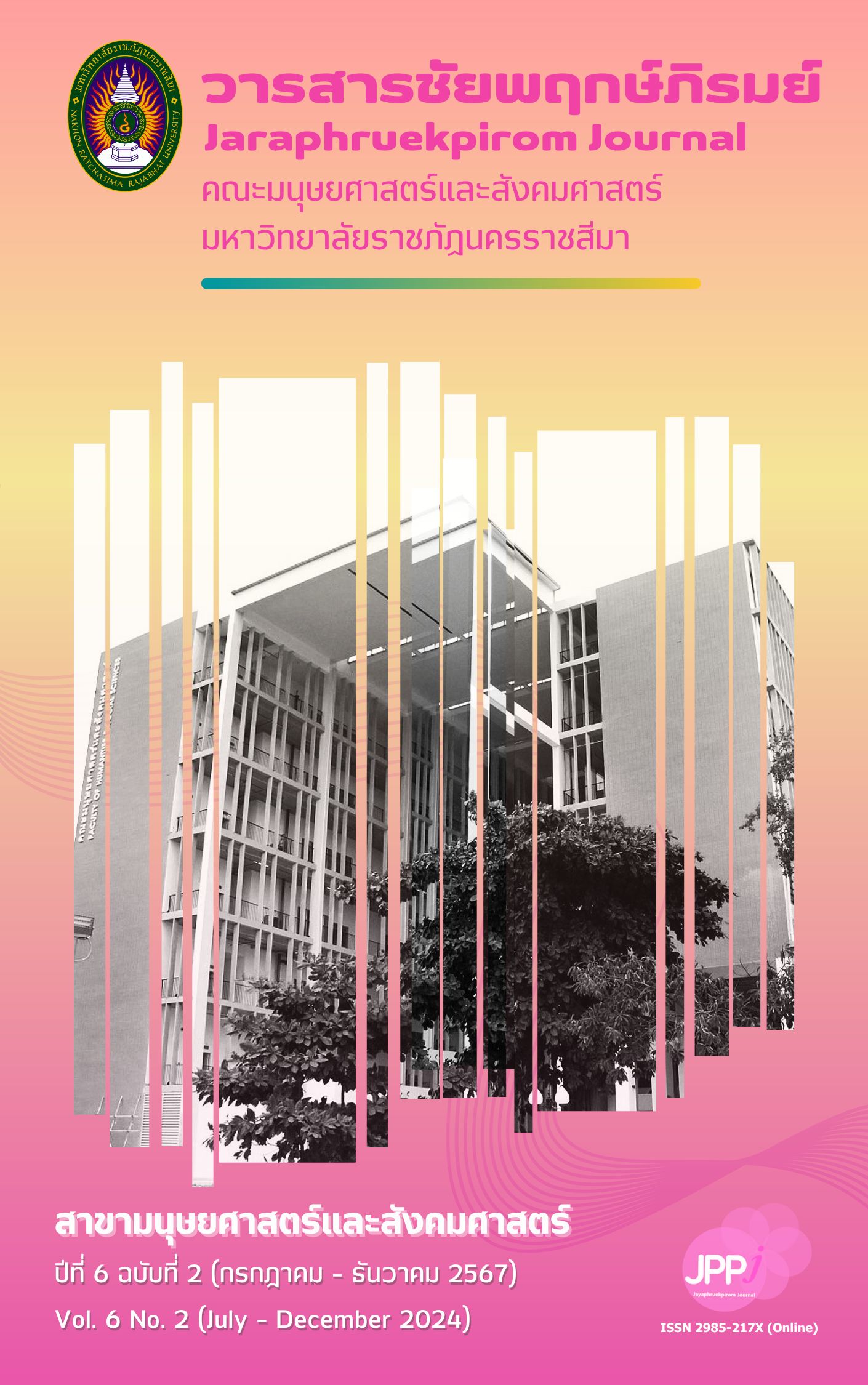Exploring the Impact of AI and Digital Tools on EFL Writing Instruction in Higher Education: A Meta-Analysis of Global and Thai Contexts
Keywords:
Artificial Intelligence, Digital Tools, EFL Writing Instruction, Higher Education, Thai ContextAbstract
The objective of this meta-analysis is to explore the impact of artificial intelligence (AI) and digital tools on English as a Foreign Language (EFL) writing instruction in higher education, focusing on their effectiveness in enhancing grammar, coherence, and vocabulary. By reviewing peer-reviewed articles published between 2010 and 2024, the study aggregates quantitative and qualitative findings using meta-analytic techniques to assess the overall impact of these technologies on writing outcomes. Findings show that AI tools, such as intelligent tutoring systems and automated writing evaluation software, offer personalized feedback that significantly improves writing performance and student engagement. Digital tools, including online writing platforms and collaborative software, promote interactive and student-centered learning, particularly in the Thai educational context, where traditional methods often fall short. Despite their potential, challenges such as limited technology access and varying digital literacy levels present barriers to effective implementation. The study highlights the transformative potential of AI and digital tools in providing personalized and effective learning experiences in EFL writing instruction. Policymakers should prioritize these technologies by funding technological infrastructure and professional development for educators. Future research should expand access to these tools, develop culturally relevant instructional materials, and explore their long-term impact on writing skills to inform policy decisions and improve instructional practices in EFL education.
References
Abdel-Hack, E., & Ahmed Helwa, H. S. (2014). Using digital storytelling and weblogs instruction to enhance EFL narrative writing and critical thinking skills among EFL majors at faculty of education. Educational Research, 5(1), 8-41.
Al-Hammadi, F., & Sidek, H. (2014). An analytical framework for analysing secondary EFL writing curriculum: Approaches for writing and preparation for higher education. International Education Studies, 8(1), 59-70. https://doi.org/10.5539/ies.v8n1p59
Bacha, N. (2010). Teaching the academic argument in a university EFL environment. Journal of English for Academic Purposes, 9(4), 229-241. https://doi.org/10.1016/j.jeap.2010.05.001
Boonsuk, Y., & Ambele, E. A. (2021). Existing EFL pedagogies in Thai higher education: Views from Thai university lecturers. Arab World English Journal, 12(2), 113-128. https://doi.org/10.24093/awej/vol12no2.9
Chanwaiwit, P., & Inpin, B. (2021). Synchronous collaborative writing instruction in a university EFL context: Challenges and solutions. World Journal on Educational Technology: Current Issues, 13(4), 571-581. https://doi.org/10.18844/wjet.v13i4.6259
Chen, Z., & Goh, C. (2011). Teaching oral English in higher education: Challenges to EFL teachers. Teaching in Higher Education, 16(3), 333-345. https://doi.org/10.1080/13562517.2010.546527
Dahal, B. K., & Gyawali, Y. P. (2022). Using English as a medium of instruction in EFL context in higher education. Marsyangdi Journal, 3(1), 51-65. https://doi.org/10.3126/mj.v3i1.47951
Dousti, M., Amirian, Z., & Nejadansari, D. (2021). Application of WebQuest-based instruction in higher education context: EFL students’ achievement in writing skill. Journal of English Language Teaching and Learning, 13(29), 113-136. https://doi.org/10.22034/elt.2021.42866.2312
Dueraman, B. (2015). The crucial point in time where Thai students are introduced to English language writing. English Language Teaching, 8(9), 96-103. https://doi.org/10.5539/elt.v8n9p96
Guo, Q., & Xu, Y. (2020). Formative assessment use in university EFL writing instruction: A survey report from China. Asia Pacific Journal of Education, 41(2), 221-237. https://doi.org/10.1080/02188791.2020.1798737
Hendrajaya, M. R. (2023). EFL teachers' perceptions of online education amidst COVID-19 pandemic in Thailand. European Proceedings of Educational Sciences, 12, 115-125. https://doi.org/10.15405/epes.23097.34
Hsiao, J.-C., & Chang, J. J. S. (2023). Enhancing EFL reading and writing through AI-powered tools: Design, implementation, and evaluation of an online course. Interactive Learning Environments, 31(3), 295-310. https://doi.org/10.1080/10494820.2023.2207187
Hwang, W.-Y., Nurtantyana, R., Purba, S. W. D., Hariyanti, U., & Surjono, H. D. (2023). AI and recognition technologies to facilitate English as a foreign language writing. Journal of Educational Computing Research, 61(5), 883-905. https://doi.org/10.1177/07356331221137253
Kawinkoonlasate, P. (2021). A study of using e-writing instructional design program to develop English writing ability of Thai EFL learners. English Language Teaching, 14(6), 43-52. https://doi.org/10.5539/elt.v14n6p43
Kim, V. (2018). Technology-enhanced feedback on student writing in the English-medium instruction classroom. English Teaching, 73(4), 29-41. https://doi.org/10.15858/engtea.73.4.201812.29
Miyazoe, T., & Anderson, T. (2010). Learning outcomes and students' perceptions of online writing: Simultaneous implementation of a forum, blog, and wiki in an EFL blended learning setting. System, 38(2), 185-199. https://doi.org/10.1016/j.system.2010.03.006
Shen, C., Shi, P., Guo, J., Xu, S., & Tian, J. (2023). From process to product: Writing engagement and performance of EFL learners under computer-generated feedback instruction. Frontiers in Psychology, 14, Article 1258286. https://doi.org/10.3389/fpsyg.2023.1258286
Song, C., & Song, Y. (2023). Enhancing academic writing skills and motivation: Assessing the efficacy of ChatGPT in AI-assisted language learning for EFL students. Frontiers in Psychology, 14, Article 1260843. https://doi.org/10.3389/fpsyg.2023.1260843
Suwarno, B., & Arasuli, A. (2018). Getting students to write English articles for publication: Student writers’ responses. International Journal of Applied Linguistics and English Literature, 7(7), 229-240. https://doi.org/10.7575/aiac.ijalel.v.7n.7p.229
Thi, T. P. H. (2019). The role of reflective teaching in improving writing skills for EFL students. Asian EFL Journal, 21(1), 140-155.
Wichanpricha, T. (2020). Roles of feedback to English writing improvement: Thai EFL novice writers in higher education. Journal of Educational and Social Research, 10(3), 133-140. https://doi.org/10.36941/jesr-2020-0115
Widiati, U., Rusdin, D., Indrawati, I., Marzuki, M., & Govender, N. (2023). The impact of AI writing tools on the content and organization of students’ writing: EFL teachers’ perspective. Cogent Education, 10, Article 2236469. https://doi.org/10.1080/2331186x.2023.2236469


